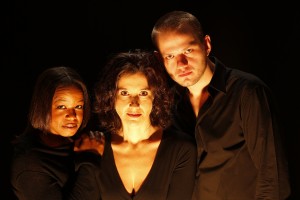Share This:
March 30, 2013 | Theatre,
Calderón, Theatre and Politics
One of the first things I was taught as a theatre student is that all theatre is political. Whether or not a theatrical piece has a political agenda, it cannot be ignored that by its very nature, artistic work has a point of view that reflects the society it stems from. It is no coincidence, therefore, that in times of political instability we see a corresponding effect on a nation’s theatre. Augusto Boal developed Theatre of the Oppressed during such a time of political instability in Brazil in the early 1960s. Bertolt Brecht developed his “epic theatre” in the midst of political turmoil in Europe in the early 20th century.
Theatre appears to bloom at times of political and social turmoil. The two fields, seemingly unrelated, are interlinked: Guillermo Calderón explores this phenomenon in Neva.
In the play, Anton Chekhov’s widow, actress Olga Knipper, and two other fellow artists huddle in a dimly lit rehearsal room in St. Petersburg at the turn on the 20th century. As they reenact scenes from their lives, demonstrators outside are gunned down by the Tsarist regime. Calderón juxtaposes theatre against the harsh realities of revolution and violence. In this context, theatre seems almost irrelevant. As the character Masha describes in her emotionally charged closing monologue:
“Why waste time doing this? How can you stand on stage knowing that out on the streets, in the world, people are dying? Bourgeois art, bourgeois theater. I hate the audience that comes to feel, I hate myself for being an actress.”
This “bourgeois theater” Masha refers to neglects to address the social and political climate of a nation. However, Calderón finds that theatre need not be irrelevant when compared to the sobering realities of revolution. The very fact that his theatrical pieces are so politically charged and rooted in historical context reinforce the fact that theatrical performance is influenced by, comments on and contributes to the political makeup of a nation.
Why, then, isn’t all theatre conscious of this? If we examine productions with political agendas, we see that it stems more often than not from cultures who have experienced trauma, whether it be in the form of a war, revolution, social upheaval, etc. We do not see as much political work produced by playwrights in the United States because in recent history we do not have as much direct experience with such things. Playwrights like Chilean-born Calderón, however, who hails from a country with a history of dictatorships and human rights violations, use theatre as a form of political expression. When asked in a Pulsa Merica interview if art is a way to deal with the past, Calderón responded:
“Only 7% of the cases brought against the former regime are closed, the rest remain open. It’s very difficult since many do not wish to speak out or talk about it. 20 years later the issue continues. The institutions have failed, so art is the last resource – it at least keeps the matter present in people’s consciousness, and encourages them to think intelligently and sensitively. Art cannot replace or substitute the role of the law and the institutions of democracy, but it helps.”
A little historical context:
In 1973, a politically polarized Chile underwent a military coup led by General Augusto Pinochet. Pinochet abolished civil liberties, dissolved the national congress, banned union activities, prohibited strikes and collective bargaining, and erased the previous administration’s agrarian and economic reforms. His 17-year rule marked a period of human rights violations; his administration tortured, jailed and executed thousands of Chileans.
According to the Latin American Institute on Mental Health and Human Rights, “situations of extreme trauma” affected about 200,000 people. In October 1973 alone, the Caravan of Death, a Chilean Army death squad ordered to carry out the executions of political enemies, murdered at least 72 people. At least 1,000 more people were killed during the first six months of the regime, and another 2,000 during the next 16 years. According to the Rettig Report, approximately 30,000 left the country, more than 2,300 were reported as “disappeared,” tens of thousands were detained and tortured.
In 1990, Chile transitioned back to a peaceful democracy. Since then, however, oppression has become part of Chile’s identity. While the human rights violations have ceased, these experiences engrained themselves into Chile’s social fabric.
This is why artists like Calderón produce works that are politicized. Theatre becomes a medium through which a nation can remember its history and analyze its present circumstances. This, perhaps, is the link that transforms performance from an irrelevant recreation to an integral part of society.
Andrea Gordillo is an Emerson BA Acting’14 student and a Dramaturgy & Outreach Assistant at ArtsEmerson.
ArtsEmerson: The World On Stage presents Neva from April 3rd-7th.





Leave a Reply